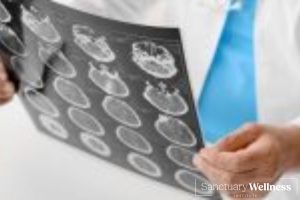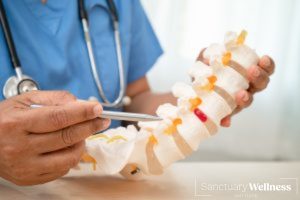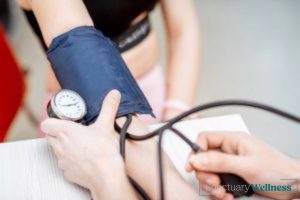Medical Marijuana for Stroke Recovery
- Jake Peter
- Published: September 17, 2024
- Fact-checked by Dr. Desiree Granados

Cannabis is a subject of interest for those navigating stroke rehabilitation due to its anti-inflammatory properties, neuroprotective effects, and ability to alleviate symptoms such as pain and anxiety. In this article, we’ll analyze the science behind medical marijuana for stroke recovery, examining the symptoms it could help alleviate, the best strains patients could use for that purpose, and more.
Does Marijuana Help with Recovering from a Stroke?
Research indicates that cannabis may be able to both reduce the severity of strokes and help patients recover from them.
Studies suggest that cannabinoids, the active compounds in marijuana, may have neuroprotective properties that could reduce brain damage during a stroke. Additionally, marijuana may help mitigate the symptoms associated with stroke recovery, such as muscle spasticity and chronic pain.
That said, the effects of marijuana can vary significantly among individuals, and more extensive, controlled studies are needed to draw definitive conclusions.
What Is a Stroke?
A stroke occurs when there is a disruption in the blood supply to the brain. During a stroke, whether ischemic (caused by a blockage) or hemorrhagic (caused by a bleed), the affected area of the brain begins to suffer from oxygen deprivation, leading to cell death. This can manifest in various symptoms, including sudden weakness, confusion, trouble speaking or seeing, and severe headaches.
Strokes can cause long-term disabilities, cognitive impairments, or even death. Rapid medical intervention is critical to minimizing these risks.
Stroke Symptoms Medical Marijuana Might Help Alleviate
Medical cannabis may be able to help alleviate the following stroke symptoms:
- Spasticity: Marijuana may help reduce the muscle stiffness and spasms often experienced after a stroke.
- Pain: Marijuana may alleviate the chronic pain associated with post-stroke complications.
- Anxiety: The calming effects of cannabis may reduce anxiety and improve overall emotional well-being for stroke survivors.
- Sleep Disturbances: Cannabis has been shown to improve sleep quality, meaning it may be able to help stroke patients struggling with insomnia.
- Loss of Appetite: Marijuana may stimulate appetite in those who experience a decreased desire to eat following a stroke.
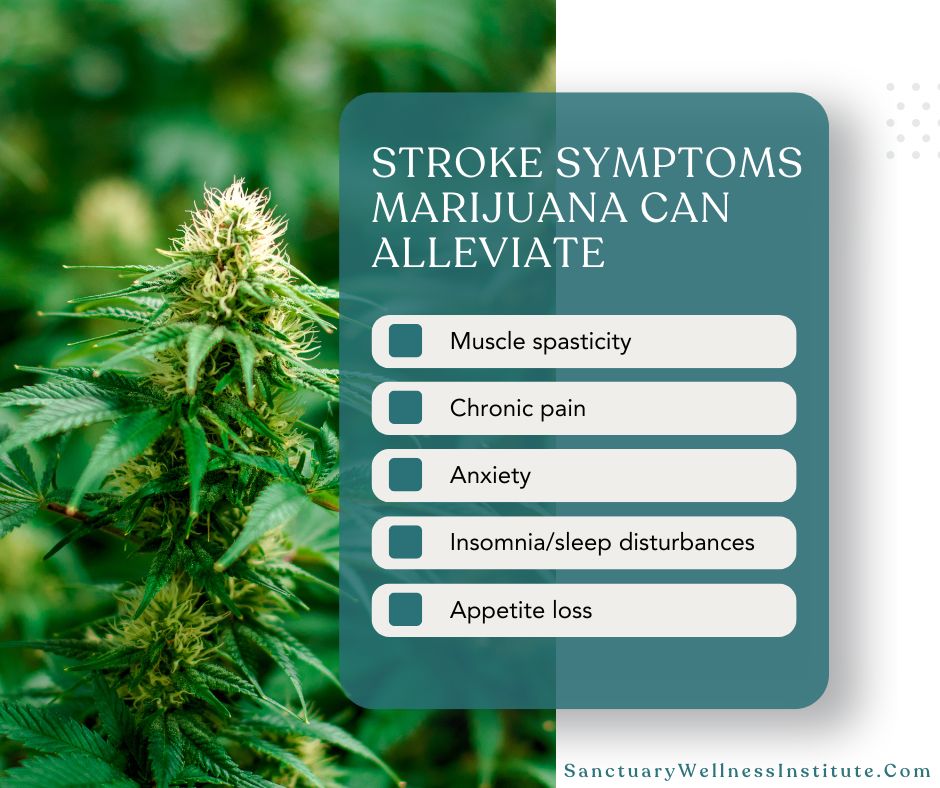
Can You Get a Medical Marijuana Card for Recovering from a Stroke?
In most states that have a medical marijuana program, you can get a medical marijuana card to help with stroke recovery symptoms. Although “stroke” is not listed as a qualifying condition in any states with medical marijuana programs, many symptoms of stroke recovery are, such as depression, headaches, and insomnia.
Rules about MMJ eligibility differ from state to state, so we recommend consulting your state’s requirements to find out whether you qualify for a card. See our interactive map “Marijuana Laws by State” for more info about the medical marijuana regulations where you live.
How to Use Marijuana After a Stroke
The most popular medical marijuana consumption methods for stroke patients include:
- Edibles: Consumed in the form of food or beverages, edibles provide a discreet, smoke-free option. They also provide longer-lasting effects, making them a great option for patients seeking sustained relief.
- Tinctures: These are liquid extracts that can be taken sublingually (under the tongue) for quick absorption. Tinctures allow for precise dosing, which can be beneficial for mitigating specific symptoms.
- Vaping: Vaporization enables you to inhale marijuana without the harmful effects of combustion. This method allows for precise dosing and provides rapid relief.
- Topicals: Creams and lotions infused with cannabinoids can be applied directly to the skin, offering localized relief from pain or inflammation without any psychoactive effects.
- Oils: Medical marijuana oils can be ingested or used in cooking, providing a convenient and versatile option for stroke patients.
Ultimately, the best consumption method for you will depend on your symptoms and your reaction to different types of cannabis products. The Sanctuary recommends consulting a physician before using medical marijuana.
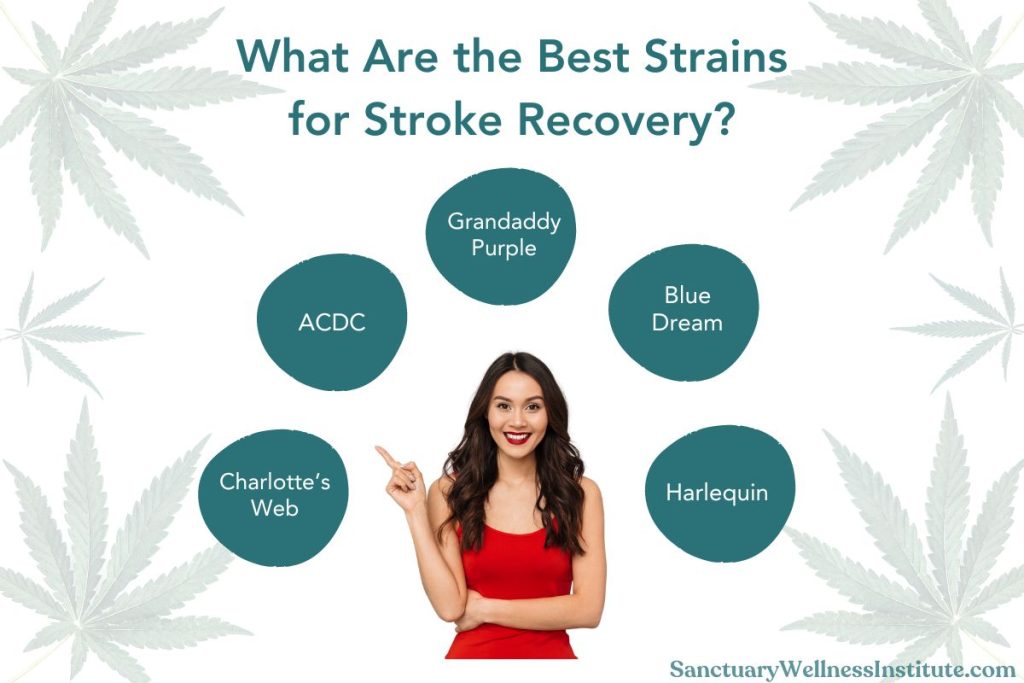
What Are the Best Marijuana Strains for Stroke Recovery?
Indica strains will likely be more useful than sativa strains to stroke patients thanks to their relaxing effects, but there are a wide variety of strains that can provide relief during stroke recovery. Some of the most effective ones include the following:
- Charlotte’s Web: This high-CBD, low-THC strain is known for its calming properties, making it great for reducing anxiety and improving mood during stroke recovery.
- ACDC: Another high-CBD strain, ACDC offers pain relief without significant psychoactive effects, helping patients manage discomfort while maintaining mental clarity.
- Grandaddy Purple: This indica strain is famous for its sedative effects. It can help with sleep issues and muscle relaxation, which can be beneficial for those recovering from a stroke.
- Blue Dream: A balanced hybrid that combines relaxing and uplifting effects, Blue Dream may help alleviate stress and improve your well-being during the stroke rehabilitation process.
- Harlequin: Thanks to its high CBD content, Harlequin is effective at relieving pain and inflammation, making it a good option for individuals seeking to manage discomfort while staying functional.
Conclusion
Medical marijuana can help recovering stroke patients manage many of their symptoms, including spasticity, chronic pain, anxiety, and insomnia. It’s essential to consult a doctor before using cannabis, though, and individual responses may vary.
If you’re interested in using cannabis to aid in your stroke recovery or address another qualifying condition, The Sanctuary Wellness Institute can connect you with a medical marijuana doctor and guide you through the process of applying for an MMJ card. Book an evaluation today to find out whether you’re eligible.
States Where We Offer Medical Marijuana Card Services
How we reviewed this article:
- Danielle C. Hergert, Cidney Robertson-Benta, Veronik Sicard, Daniela Schwotzer, Kent Hutchison, Dan P. Covey, Davin K. Quinn, Joseph R. Sadek, Jacob McDonald, and Andrew R. Mayer (2021). Use of Medical Cannabis to Treat Traumatic Brain Injury
https://www.ncbi.nlm.nih.gov/pmc/articles/PMC8260892/ - Fresh Toast and Nicole Skrobin (2019). Cannabis: Optimal treatment method for post-concussion syndrome symptoms
https://www.chicagotribune.com/2019/08/30/cannabis-optimal-treatment-method-for-post-concussion-syndrome-symptoms/ - Cleveland Clinic (2023). Marijuana (Cannabis, Weed)
https://my.clevelandclinic.org/health/articles/4392-marijuana-cannabis
Current Version
September 17, 2024
Written By
Nicholas DiBella
Fact-checked By
Dr. Desiree Granados
Editorial Process
Our Editorial Process
Other Posts About Medical Marijuana Treatment

Jake Peter received his journalism degree from Emerson College and has been writing content for the Sanctuary Wellness Institute since 2021. He is passionate about all things cannabis.

